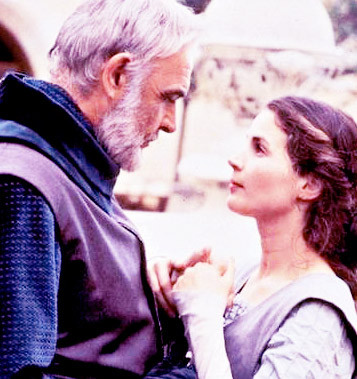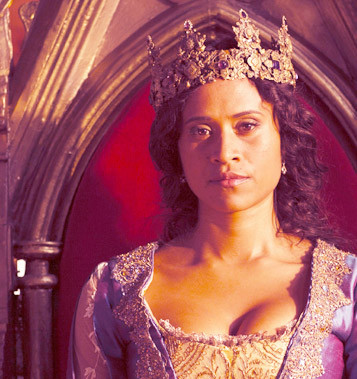First Knight, a 1995 film adaptation of the Arthurian legend, offers a unique take on the classic love triangle. While the film received mixed reviews, its portrayal of Guinevere’s emotional struggle resonates with audiences even today. One of the central questions the film raises is: why does Guinevere confess her love for Arthur despite her undeniable attraction to Lancelot? This article delves into the complexities of Guinevere’s decision, exploring the film’s nuanced depiction of love, duty, and the evolving concept of feminine strength.
 Guinevere and Arthur in First Knight
Guinevere and Arthur in First Knight
First Knight diverges from traditional portrayals of the Arthurian legend by grounding the story in a more realistic context, minimizing magical elements and focusing on political intrigue and personal relationships. This allows for a more intimate exploration of Guinevere’s character, presenting her not as a passive damsel but as a woman with agency, torn between her obligations and desires.
Duty vs. Desire: Guinevere’s Internal Conflict
Guinevere’s confession of love for Arthur is not a simple declaration. It’s a multifaceted decision rooted in a complex web of factors. Marrying Arthur offers protection for her people and her lands, threatened by Malagant. Her love for Arthur, while perhaps not as passionate as her feelings for Lancelot, is based on respect, admiration, and a shared vision for a just and peaceful kingdom.
 Guinevere and Lancelot in First Knight
Guinevere and Lancelot in First Knight
This contrasts sharply with her connection to Lancelot. While undeniably drawn to his charisma and rebellious spirit, Guinevere recognizes the danger their relationship poses. Lancelot represents passion and individual freedom, tempting her to break free from the constraints of duty. However, she understands that succumbing to this temptation would jeopardize the stability of Camelot and betray the trust Arthur has placed in her.
Guinevere’s Strength: A 90s Feminist Perspective
First Knight’s Guinevere embodies a specific type of feminist ideal prevalent in the 1990s. She is strong and independent, capable of leading and making difficult decisions. Yet, her strength is not defined solely by physical prowess or rejection of traditional feminine roles. Instead, the film highlights her inner resilience, her commitment to her principles, and her willingness to prioritize the greater good over personal happiness.
This is evident in her conversation with Arthur where she acknowledges the fleeting nature of passionate love, emphasizing the importance of willpower and commitment in building a lasting relationship. Her choice to marry Arthur reflects a conscious decision to embrace responsibility and contribute to a larger purpose. It showcases a more nuanced approach to feminism, acknowledging the complexities of balancing personal desires with societal expectations.
 Guinevere looking contemplative
Guinevere looking contemplative
Guinevere’s Choice: A Reflection of Evolving Feminism
Compared to earlier depictions, and even subsequent adaptations like King Arthur (2004) and the BBC series Merlin, First Knight’s Guinevere represents a transitional phase in the portrayal of female characters. She is not a passive victim nor a hardened warrior, but a woman grappling with competing desires in a patriarchal society. Her ultimate decision to declare her love for Arthur is a testament to her strength and her commitment to a higher ideal, even at the cost of personal fulfillment.
In conclusion, Guinevere’s confession of love for Arthur in First Knight is not a simple act of deception but a complex choice driven by duty, respect, and a desire for stability. Her character, viewed through the lens of 1990s feminism, offers a nuanced portrayal of female strength and the enduring struggle between personal desires and societal expectations. The film invites viewers to consider the multifaceted nature of love and the difficult choices we sometimes face in the name of duty and loyalty.

